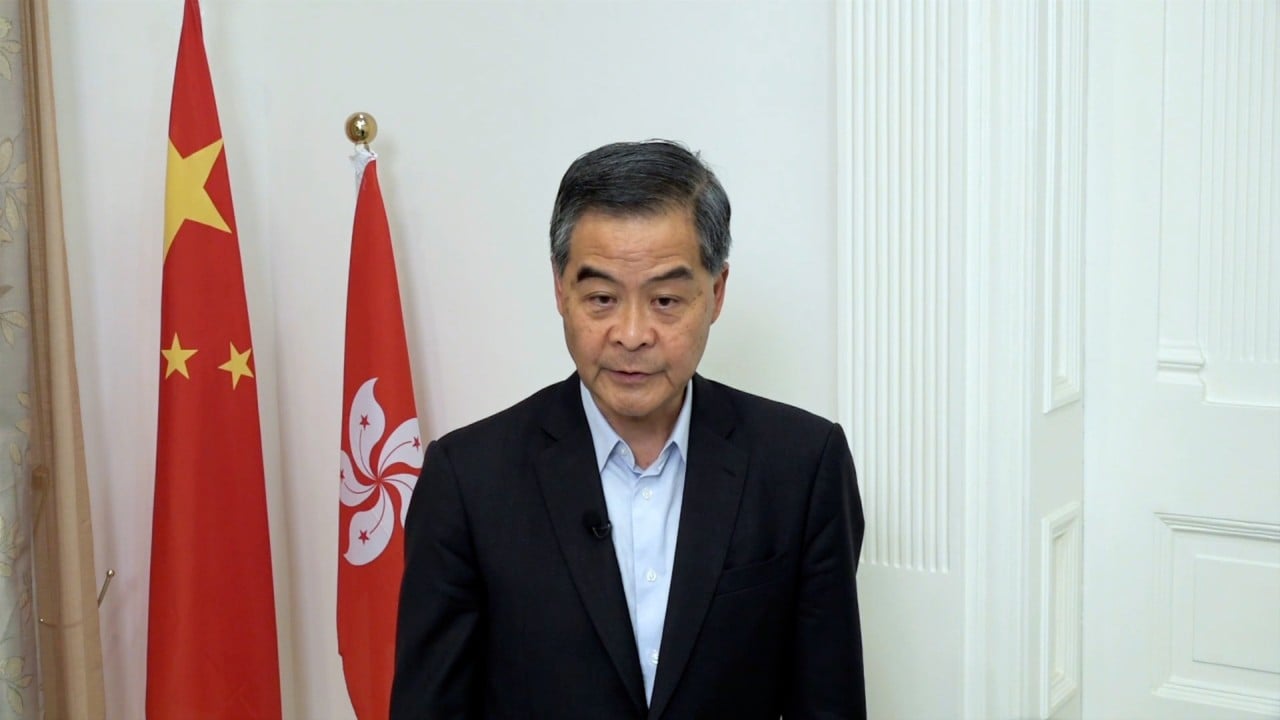
Former Hong Kong leader CY Leung ramps up housing plan campaign, despite government dismissing his bid to build on edge of country park
- Former chief executive wants to build 25,000 flats on edge of Tai Lam Country Park
- Carrie Lam has already said idea is a non-starter, but experts believe suggestion could be part of Leung’s bid to regain top job
He dismissed suggestions that he was campaigning for a return as the city’s chief executive when asked whether his lobbying for housing reform and his active engagement with community leaders on public policy discussions signalled such an ambition.
“For the last 30 years in Hong Kong, I maintain very close contacts with … everyone in Hong Kong. I’ve been going to the wet markets, the flower market, the goldfish market and so on. That’s part of my life, so don’t read politics into all this,” he told the Post.

Some political analysts said they believed Leung was trying to boost his popularity among the public, with one warning that the former leader must be mindful of taking a “high profile” approach when there were still nine months to go until the next polls.
Housing experts said any plan to develop country parks should be first tested with feasibility studies.
Last month, Leung revived a controversial housing idea, that had previously been shot down by the current government, and suggested using no more than 100 hectares (247 acres) on the fringes of the 5412-hectare country park to build 20,000 to 30,000 public housing flats for sale, pricing them each at HK$6,000 (US$773) per square foot.
But Leung has refused to back down. Uploading a new video on Facebook on Friday, he said a group of engineers, surveyors and planners had helped him draft a conceptual plan.
The group, Leung said, chose a site on the edge of the second-largest country party in the city, which is near the Route 3 highway and the Kam Sheung Road MTR railway station, proposing that 25,000 flats, of about 500 sq ft each, could be built on only 70 hectares of land.
He later told the Post that another 3.65 hectares of land on the site would be earmarked for elderly homes, where 1,000 residents could live in self-contained units surrounded by green space.
Leung, now a vice-chairman of the Chinese People’s Political Consultative Conference, dismissed the idea that his suggestion was part of an election bid, and pointed to the fact that it was “part of my plan when I was the chief executive, and it was in my last policy address [in 2017]”.
“I think it’s a proposition that the people should consider, it belongs to the community,” he said.
Referring to his successor’s land supply strategy, Leung said: “I don’t exclude other initiatives or propositions to increase land supply, whether its land reclamation … or using the brownfield sites, I think nothing should be excluded until we actually examine the … engineering, financial and planning feasibility.”
Leung added that after Beijing’s drastic electoral changes in the city, his idea deserved to be looked at again because there would be no more filibustering by the opposition.
To expedite the process, he said officials should go ahead with preparing building plans as well as inviting buyers’ applications and selecting them while waiting for planning approval.
Asked in April whether he had decided to run for the top job again, Leung said he was open to taking up any role “beneficial to the interests of the country”.
Marco Wu Moon-hoi, the former Housing Society chairman, who advised Leung’s election platform and who was in charge of the country park housing research when it was terminated by Lam’s administration, said the plan should first go through proper feasibility study, adding that he had reservations about selling the flats at construction cost, as it would involve more government subsidies.

In an article published in the Post on Tuesday, Roger Nissim, assistant director of Lands of the Government in the 1990s, said country parks should not be considered for housing as the current administration had secured enough land – through major development projects and redeveloping brownfield sites – to produce 316,000 public rental housing flats for the coming decade.
About a third or 101,300 homes should become available in the first five years, while the remaining two thirds should come in the second five years, he added.
“These are significant numbers that should completely dispel any suggestions that land from our country parks be considered for public rental housing or any other form of housing,” he wrote.
Lau Siu-kai, vice-chairman of the semi-official Beijing think tank the Chinese Association of Hong Kong and Macau Studies, believed Leung hoped to earn Beijing’s trust through his ability to solve the housing crisis.
“He hopes to gain some public popularity through addressing some long-term problems in the city,” Lau said. “On the positive side, at least it can put some pressure on the current administration ... It will definitely help, no matter if he is running for the top post later.”
Dr Cheung Chor-yung, a political scientist from City University, said Leung either had his sights set on the top job, or becoming a commander within the pro-establishment camp.
But, Leung’s “outspoken attitude” could do him more harm than good, Cheung added, as Beijing “might think he is overly aggressive”.



